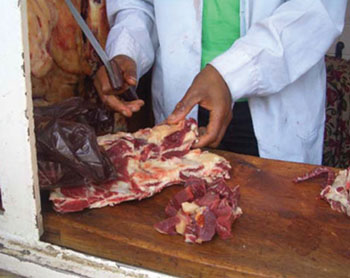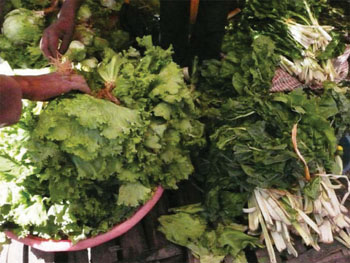7.3 Principles of safe food preparation
Why is it important to eat safe food?
If we eat safe food our health will be protected, we are less likely to get sick and we are more likely to stay healthy and productive.
You need to be able to advise people in your community about the correct methods of food handling and preparation to ensure that food is safe to eat. The key principles for safe food preparation are outlined below.
- Choose foods that are not easily damaged by transportation, accidents or by storage.
- Cook foods thoroughly, especially meat (Figure 7.4) because this can help to kill any microorganisms that might be present in the food.
 Figure 7.4 Meat is a healthy and nutritious food but it can become unsafe if it is not handled properly. (Photo: Zegeye Hailemariam)
Figure 7.4 Meat is a healthy and nutritious food but it can become unsafe if it is not handled properly. (Photo: Zegeye Hailemariam)
- Eat cooked foods immediately after they are cooked, rather than leave them out and eat later. Delays in eating cooked food can lead to the growth and reproduction of microorganisms in the cooked foodstuff.
- Store cooked food carefully at an appropriate temperature. It should either be kept cold, ideally in a refrigerator, or it should be kept hot.
- If food must be reheated, be sure to reheat it thoroughly.
- Avoid contact between raw and cooked food.
- Wash hands properly before handling food and before eating.
- Keep all kitchen surfaces and utensils meticulously clean.
- Protect food from animals including insects, rodents and other animals.
- Use safe water in food preparation and for washing fruits and vegetables to be eaten raw (Figure 7.5).

These principles will be described in more detail in Study Session 10.
7.2.2 Food that is not safe to eat
